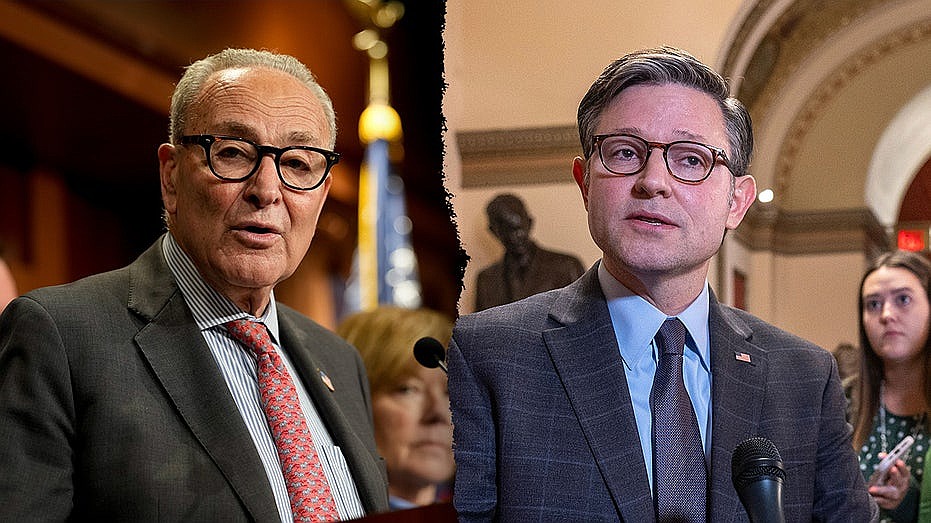Johnson shuts down House to pressure Schumer as government standstill nears one month
In a continuing standoff over federal funding, House Speaker Mike Johnson, R-La., has announced the cancellation of votes in the House of Representatives for the fourth consecutive week, as the government shutdown persists with no clear resolution in sight. This decision is part of Johnson’s strategy to exert pressure on Senate Democrats, particularly Minority Leader Chuck Schumer, D-N.Y., who have rejected the GOP’s federal funding plan a staggering twelve times since the House initially passed the measure on September 19. That date also marks the last time the House was in session, leaving lawmakers largely absent from Washington and spending time in their home districts for over a month. The Republican leadership is pushing for a short-term extension of fiscal year 2025 spending levels through November 21, aiming to provide a window for negotiators to forge a more comprehensive deal for fiscal year 2026.
The situation has escalated tensions between parties, with Democrats expressing frustration over being excluded from discussions regarding federal funding. They are withholding support for any spending bill that does not also extend enhanced Obamacare subsidies, which are set to expire at the end of this year. Johnson’s announcement came during a brief pro forma session, a constitutional requirement that ensures the House meets periodically, even without formal legislative activity. During these sessions, lawmakers can still make speeches or introduce new legislation. House Minority Leader Hakeem Jeffries, D-N.Y., criticized the Republicans, stating they have effectively been “on vacation for the last four weeks,” while Republicans have largely rallied behind Johnson’s approach. However, dissent is brewing within the GOP ranks, with members like Reps. Kevin Kiley, R-Calif., and Marjorie Taylor Greene, R-Ga., openly questioning Johnson’s strategy. Kiley, for instance, argued that lawmakers should be actively working towards resolving the shutdown rather than remaining absent from the House.
As the impasse continues, concerns are mounting among some House Republicans about the effectiveness of Johnson’s strategy. During private calls, members have expressed worries that their absence from Washington is diminishing their messaging and impact. Rep. Beth Van Duyne, R-Texas, recently suggested that the GOP might be in a stronger position if they were actively engaged in legislative sessions. This internal conflict highlights the challenges Johnson faces not only in negotiating with Democrats but also in maintaining unity within his party as they navigate the complexities of federal funding and the ongoing government shutdown. With the deadline for a resolution approaching, the pressure is mounting on both sides to reach a compromise that can avert further complications for the federal government and its operations.
Related articles:
– Link 1
– Link 2
Speaker Mike Johnson, R-La., has canceled votes in the House of Representatives for a fourth straight week as the
government shutdown
shows no signs of ending.
Johnson’s move is a part of his continued pressure strategy on Senate Democrats and Minority Leader Chuck Schumer, D-N.Y., who have sunk the GOP’s federal funding plan 12 times since Sept. 19, when the House passed the measure.
Sept. 19 was also the last day the House was in session, meaning lawmakers have been largely in their home districts for over a month.
Republicans are pushing a short-term extension of fiscal year (FY) 2025 spending levels through Nov. 21, aimed at giving congressional negotiators time to strike a longer-term deal for FY2026.
SCREAMING MATCH ERUPTS BETWEEN HAKEEM JEFFRIES, MIKE LAWLER AS GOVERNMENT SHUTDOWN CHAOS CONTINUES
Democrats, furious at being sidelined in federal funding discussions, have been
withholding their support
for any spending bill that does not also extend COVID-19 pandemic-era enhanced Obamacare subsidies that are due to expire at the end of this year.
Johnson’s decision was made public on Friday afternoon during a brief pro forma session in the House. Under rules dictated by the Constitution, the chamber must meet for brief periods every few days called “pro forma” sessions to ensure continuity, even if there are no formal legislative matters at hand.
Pro forma sessions can also be opportunities for lawmakers to give brief speeches or introduce legislation that they otherwise would not have.
Democrats have criticized Johnson’s decision, with House Minority Leader Hakeem Jeffries, D-N.Y., telling reporters that House Republicans have been “on vacation for the last four weeks.”
Republicans, however, have largely stayed united behind Johnson as the shutdown continues.
But there have been several notable defections. Both Reps. Kevin Kiley, R-Calif., and Marjorie Taylor Greene, R-Ga., have made their criticism of Johnson’s strategy known publicly for weeks.
“I believe very strongly that it’s the wrong decision,” Kiley told MSNBC earlier this week, adding House lawmakers were not “doing all the things we’re supposed to be doing” aside from figuring out how to end the shutdown.
BATTLEGROUND REPUBLICANS HOLD THE LINE AS JOHNSON PRESSURES DEMS ON SHUTDOWN
Multiple House lawmakers have also raised concerns about being out of session on private weekly calls that Johnson holds with members of the GOP conference.
Rep. Beth Van Duyne, R-Texas, was the most recent House Republican to suggest the GOP could be in a stronger position if they were back in Washington, Fox News Digital was told.
“I think the longer that we are out, the messaging is starting to get old,” Van Duyne told fellow House Republicans on their Tuesday call.
Eric
Eric is a seasoned journalist covering US Politics news.



